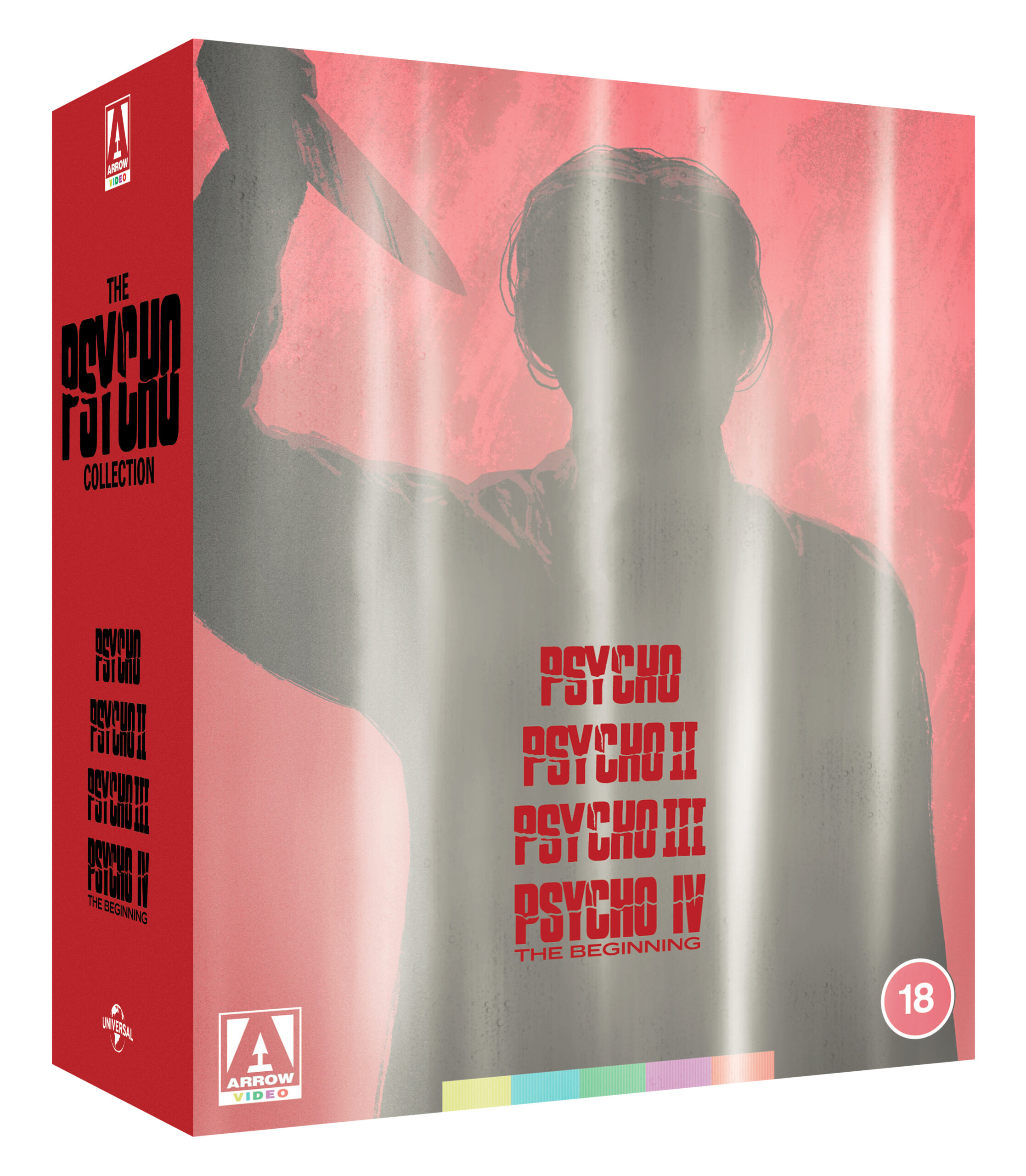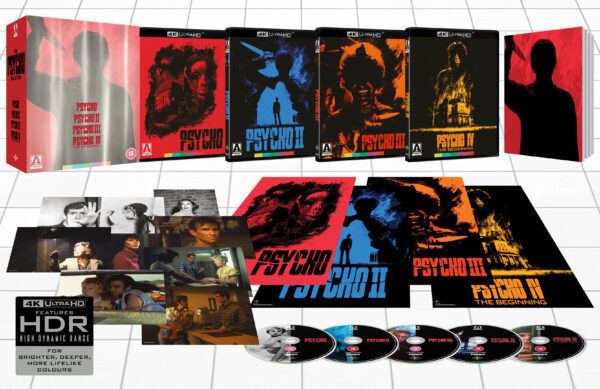
The Psycho Collection 4K Boxset Review

Arrow Video have put together a very nice package housing all four of the official Psycho film series spanning some 30 years.
PSYCHO
If anyone has not seen Psycho and somehow has managed to avoid all spoilers then to introduce the film – Psycho features Marion Crane (Janet Leigh) on the run from her life with a purse full of money. We follow Marion out of town, sleeping in her car, followed by the suspicious highway patrol, changing her car and heading into the backroads filled with heavy rain, and an increasing sense of guilt and dread in her mind as she goes. She then decides to take a pit stop for the night at an empty motel. There she encounters Norman Bates (Anthony Perkins) and cinema history was made.
The film is still to this day (over 60 years) still seen as one of Alfred Hitchcock’s best and features Bernard Herman’s iconic score, a Saul Bass credits sequence, memorable set pieces and great performances from Leigh and Perkins.
The disc for Psycho comes curtesy of Universal Pictures which means there are no addition extras from Arrow on there. But there is a wealth bonus material from Universal including a detailed making of documentary, various behind the scenes featurettes, a commentary from Stephen Rebello (who wrote the book on the making of the film) and various press materials.
This is the only disc in the set not to contain a 4K restoration of the film. The Blu-ray we get here isn’t anything to stick your nose up at though. Sound comes in Original mono and 5.1 options. The film looks clean and being in black and white it’s very striking on this format.
Despite the fact that Arrow was unable to add to the mix here, Universal already have a pretty good disc intact anyway.
PSYCHO II
Over 20 years had passed and writer Tom Holland (Child’s Play, Fright Night) wrote a script that isn’t just smart but it also has its own dark done (not to mention playful humour) that brings back Perkins in his iconic role. Norman Bates is released from the institution and returns home a reformed man. He gets a part time job and starts to look after the dusty old business that is the Motel and his home. However, there are many eyes on Norman. Nobody trusts him, nobody seems to want to help him re-enter in to society, and before you know it – bodies start to drop.
It almost seems obscene to want to make a sequel to one of the most beloved of horror thrillers in cinematic history; and yet director Richard Franklin (along with Tom Holland’s script) found a way to make it well above par in terms of anyone’s expectations. Psycho II doesn’t do any damage to the original, but it does deliver us a very interesting thriller with a few twists of its own.
The 4K clean up on this looks good. The film was lit fairly brightly, especially daytime scenes – so there is a slight TV soft focus feel to them. But it’s a good picture. Jerry Goldsmith goes for something altogether more sympathetic and pretty in terms of the score bringing out the innocence of the character of Norman.
This disc comes with two audio commentaries. One from film historian Michael Brooke and author Johnny Mians. This duo has provided various commentaries for Arrow and deliver a well-read take on the material. The second commentary is an existing one by the screen writer Tom Holland which as one of the filmmakers is well worth a listen.
There is a 45-minute Masters of horror discussion with Tom Holland (Psycho II) and Mick Garris (Psycho IV) moderated by Robert Galluzzo. Galluzzo directed the 90-minute documentary The Psycho Legacy which sadly is not included on this set.
Franklin delivers a 20 minutes audio interview and also a short commentary over one scene (and it’s very detailed) – a shame he didn’t cover the entire film!
Author Chet Williams talks about original Psycho author Robert Bloch and the sequel books that came along.
There is also a ton of vintage press materials, images, TV spots and trailers.
PSYCHO III
Anthony Perkins took over directorial duties on this one and there is a surprising amount of flair on show here. Perkins clearly understands the character and the tone to go for, and he starts right out the door with a massive homage to Hitchcock, one in which you could imagine Hitchcock would be proud of, not just because of the cheeky rip off, but because of the twist in the scene that has added dark humour to it. It’s a real attention grabber.
The story here has Norman as we left him at the end of Psycho II: utterly insane, mother installed upstairs and running the Motel as per normal. It’s only a matter of time before the wrong types of people cross his path and the killing starts up again.
Psycho III doesn’t quite have the same tricks that the first two films had to offer. It is a sense of more of the same but with a less compelling plot. Perkins as director is a plus and there is a shift in tone (almost knowing that it would be futile to compete with the previous films), so Psycho III does have merits and a surreal quality to it. What is does deliver on is the continual sense of tragedy. But there is also a lingering sense of the sexual, sensual, the perverse and delusion among the characters. The film ups the sex and violence ante tying it to some of the more lurid exploitation of 80s cinema and video. Jeff Fahey shows up in one of his early roles as a character you just know is begging for comeuppance and Carter Burwell delivers one of his early scores and it doesn’t try to complete with anything even remotely Bernard Hermann; but he does deliver something that sticks in the mind and, like the film, is worth checking out.
Michael Brooke and Johnny Page return for another commentary and continue the good work talking about the time and the talent involved. There is also an existing commentary by the screenwriter Charles Edward Pogue for anyone interested in that angle.
There are some valuable new materials as well: There is a fairly recent Fahey interview. There is also an interesting interview with Brinke Stevens on her small role in the film. Beyond this there is the usual press kit materials, images and trailer galleries.
PSYCHO IV: THE BEGINNING
Mick Garris takes over the directorial duties for this made for TV movie. This time we get to go back in time for a portion of the film to see how Norman Bates became “Norman Bates”. Henry Thomas plays the young Norman and Olivia Hussey plays the infamous “Mother.” Perkins returns for the modern-day setting Norman and his introduction scene strikes a chord as he turns to camera and states his intentions. He spends his time chatting on the phone with a late-night radio host (the always compelling CCH Pounder) and then the film flashes back to Norman’s history with his mother played by Thomas and Hussey respectively. Thomas has the hard work of playing the “younger” version of Norman, but Hussey gets a challenge in delivering on a role that before now has only ever been represented by the thoughts of others; through Norman; or as a corpse in a chair. To see the character living, breathing and tormenting Norman – even in Hussey’s ill-fitting accent – must have been a main draw to the project in the first place.
The film returns to Bernard Berman’s original music for backing which also states the films intentions to dial the series back to a straighter tone.
The best thing Psycho IV does perhaps is to lay the idea for the Bate’s Motel series that would come in later years. The film itself is fine, but the leap in time from the third film to this misses out some key ingredients that might have been a fascinating focus for a story – namely the fact that Norman got married and had kids? Considering his background with sex and women it may have been interesting to find out how this came about so fast.
A fifth film was apparently in the works before Perkins passed on, but Psycho IV does have some finality to the narrative. Psycho original screen writer Joseph Stefano returned for this fourth outing, but it can’t match the original – few prequels can do justice, yet alone original story prequels.
Director Mick Garris and his two stars of the flashback scenes Henry Thomas and Olica Hussey deliver on the only commentary for this film – which also highlights perhaps that even the author academics were not interested in talking over this one as well as the previous two films, which is a shame.
There are also a couple of short features on the set work, effects work and music score. Not quite as loved up as the previous two films, but the Commentary is engaging enough from the actual film makers on it.
DISC 5 – BONUS: PSYCHO IV TV Aspect Ratio (UHD – LTD EDITION EXCLUSIVE)
-4K (2160p) Ultra HD presentation of the film in 1.33:1 TV aspect ratio
Other extras include:
A fifth disc including Psycho IV TV Aspect Ratio (UHD – LTD EDITION EXCLUSIVE)
4K (2160p) Ultra HD presentation of the film in 1.33:1 TV aspect ratio. This version also features the same commentary from the last disc.
As for the packaging there are:
-Reversible Sleeves featuring original and newly commissioned artwork by Matt Griffin
-Double-sided posters for each film featuring original and newly commissioned artwork by Matt Griffin
-9 postcard sized reproduction art cards
-120-page perfect bound collector’s book featuring new writing by film critics John-Paul Checkett and Johnny Mains plus select archival material.
With everything here it’s a must have collection. Simply put – the films have never looked or sounded as good or with this collection of bonus material to boot.
Steven Hurst
